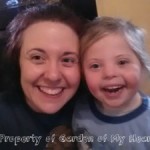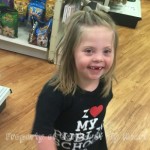I’m sad.
Recently, an exchange of words took place on Facebook, twitter, blogs, and large, national sites like The Mighty and Huffington Post.
I’m sad because this is an opportunity missed.
See, people with disabilities have been harnessing the power of the internet for a long time now in hopes of getting their own words out there. There has been various amounts of success in reaching national platforms, but the words are still there, ready to be scooped up, devoured, considered, and heard.
But I’m sad because the most important audience of all – parents of kids with disabilities – doesn’t seem to be listening.
As parents, we research our children’s diagnoses. We know pretty much everything there is to know about the logistics of it. How it might affect our children, what things to watch for, what services might be helpful.
But it seems we are forgetting crucial pieces of the puzzle: the perspective of people who actually have that diagnosis, and the voices of the larger disability community.
We demand (and rightly so) that those around us see our children as human beings, treat them as such, and believe in their potential. We demand that they hear our children. We wonder why they are so reluctant to do so, “even after all these years of advocacy and inclusion.”
When we first hear our children have a diagnosis, we do the natural thing: we reach out to other parents. We hope for answers and we hope for peace of mind.
It took me this long to realize that my fellow parents are only part of the puzzle and they can only offer me so much peace of mind. Only people who live with Down syndrome can walk me through what it feels like.
Oh, but that’s ok, we tell ourselves. We justify our non-involvement of people with Down syndrome by saying we are having private conversations or that we are talking about things only parents can understand. Let me be clear: these things are ok and good and helpful. The problem starts when we don’t leave that bubble, or react with anger when disabled voices encroach on that bubble.
It is a rare day that we invite people with Down syndrome to the table to talk. Even a recent television show that purports to be “about” people with Down syndrome heavily features their parents, and certainly holds the parents as authority.
The disabled community has long produced work (writing, video, song, art) to put voice to its many perspectives, but what catches our eye, and our likes, and our shares, and our national media is the stuff we parents produce. Our tearful admissions. Our heart warming stories. The things we produce without consent, and in some cases, without consideration.
So when the disabled community takes to twitter and facebook and national media to remind the world “nothing about us without us,” I think it is time for the parenting community to sit back and listen.
I get it. I do. Some of what is being said makes it sound like parents aren’t important at all. Some of it sounds like we’ve done irreparable damage. Some of the words are critical, some are chastising. I get why the gut reaction is a roll of the eyes and a heels-dug-in commitment to “do what I want” regardless of what the disabled community is trying to say.
But when someone comes at you with anger, fear, and sadness, I think it is the perfect time to stay silent, listen, and get humble. The disabled community is asking for allies, but that can only happen if we fully examine what the parental role means in the context of disability.
That examination can only happen if we listen and carefully consider what we are hearing, rather than insisting that the disabled community is wrong about its own lived experiences, it own desires, and its own hopes for the future.
Parents, think about this: ignoring disabled voices is exactly what frustrates, saddens, and angers us about the world in regard to our children. We would not stand for “outsiders” doing it to our kids – so why do we persist in doing it to our children’s own community?
The world ignoring our children starts at home if we are unwilling to listen to our children’s peers. We are part of the problem.
In a nutshell, this is what the recent campaign is asking of parents:
-consider what, why, and how you are posting information about your child
-would you publicly share this same information about your other children, an aging parent, or yourself?
-are you inadvertently (or intentionally) spreading an ableist message, or sharing inspiration porn?
-are you living the principle of “nothing about us, without us”?
If we want dignity and respect and consideration from the world, then we need to show the same as parents – not just for our own children, which we do naturally, but for their community. We can be in this together, but parents need to scoot over a bit, even when our children are non verbal. Part of advocating for our non verbal children is making sure the voice of their community is amplified and heard; it doesn’t stop at merely being the voice for our own children.
No one has called for a blanket ban on parent groups, blogs, or social media postings. Our children’s community is merely asking us to think before we post, and to keep private conversations private. There will always be a need for parents to speak to other parents. Parents reaching out to parents is a helpful, healthy thing as we encourage each other to be even better advocates and allies.
And to be clear, I am guilty of all of this – ableist posting, inspiration porn, divulging information that I probably shouldn’t have. I am not holding myself out as perfect, but merely sharing where I am in my thought process surrounding voice and dignity. I am a work in progress, and hope my fellow parents are willing to join me in this work.
We just need to remember not to speak for, but to speak with, and to look to those who have a disability for guidance.







12 Responses to Voice